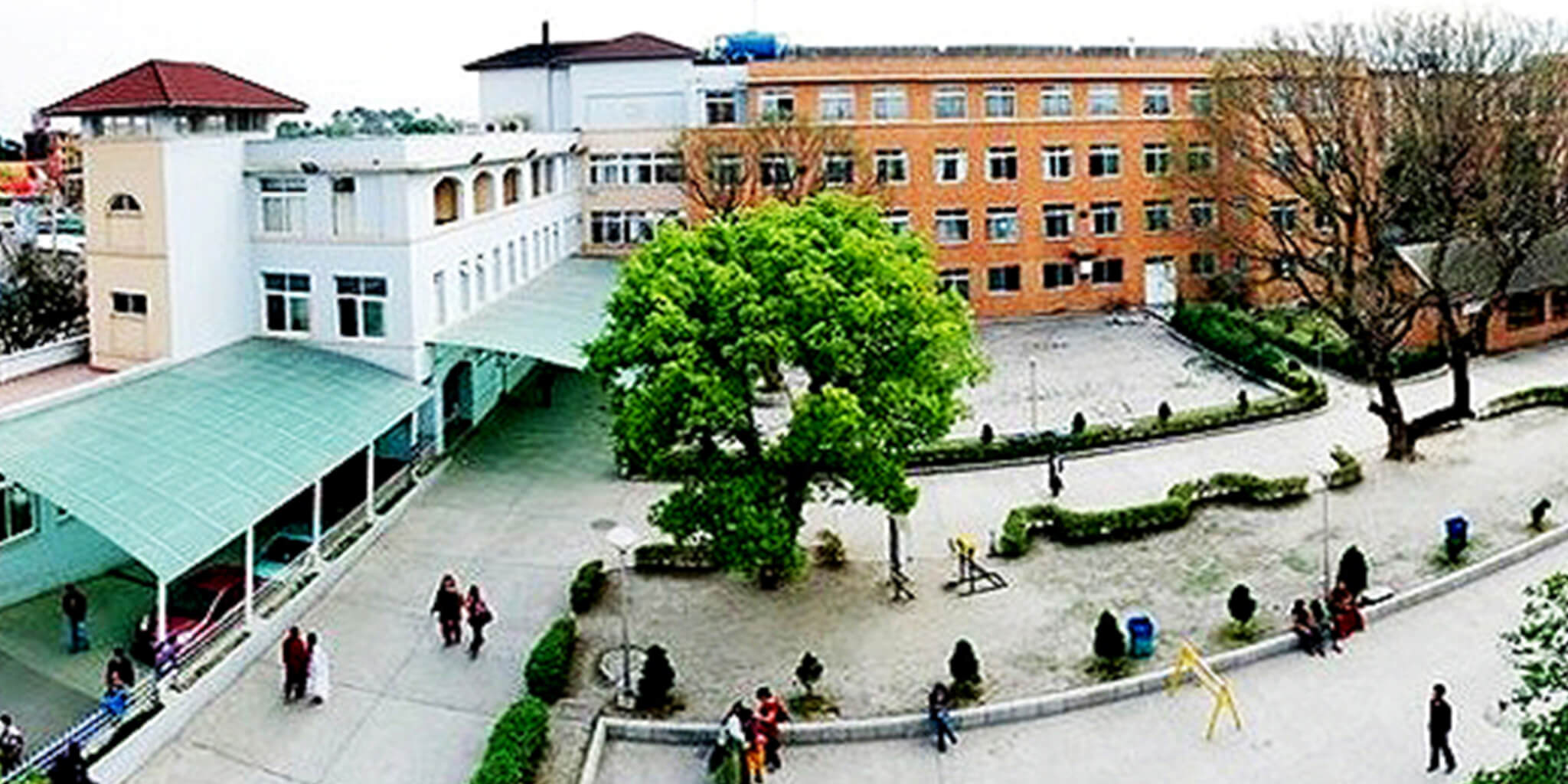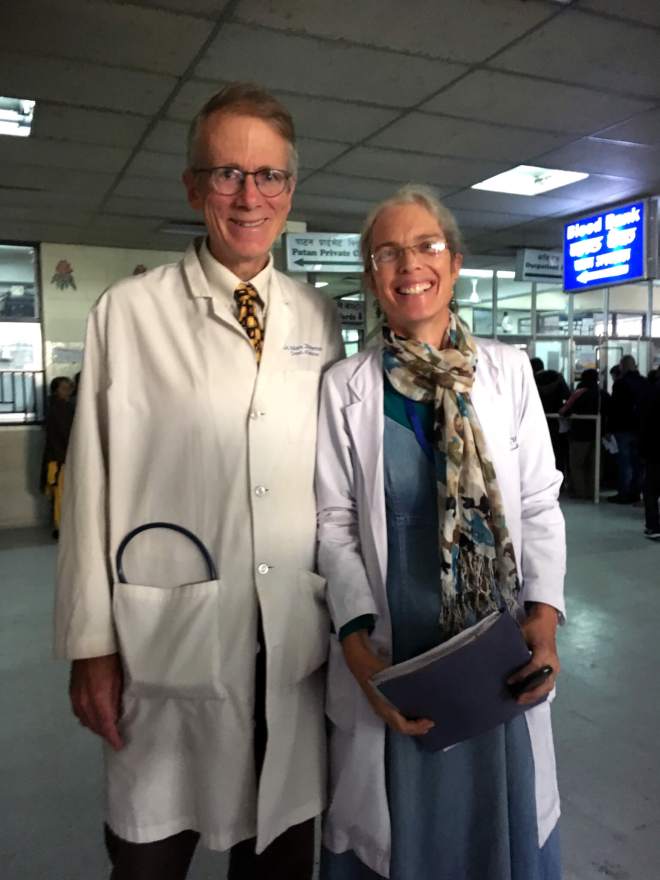Healing and hope in Nepal: Patan Academy of Health Sciences

By Mark Zimmerman
March 2020 | ATLANTA
Dr. Mark Zimmerman is a missionary physician serving with Patan Hospital in Lalitpur, Nepal. He is a senior consultant and professor with the hospital, which has grown into a government medical school, the Patan Academy of Health Sciences. In addition to patient care responsibilities, he teaches medical students and is involved in establishing a training program for internal medicine specialists. The mission of Patan Hospital is to provide quality, compassionate health care to everyone who comes to the hospital, regardless of ability to pay. It serves people from every district of Nepal, from the remote villages as well as from the Kathmandu valley. The following is an excerpt from Zimmerman’s Christmas 2019 letter to family, friends and supporters.

PHOTO: COURTESY THE ZIMMERMAN FAMILY
The week before Christmas, toward the end of medical rounds, the resident doctors and I came to the bed of a sturdily-built young woman lying still and straight on her back. One of the doctors presented her case to me as a 36-year-old who’d come in from the eastern district of Sindhuli because of several days of abdominal pain and vomiting. On examination, he’d found her abdomen soft but tender; an elevated blood lipase pointed to acute pancreatitis as the cause. But there’s always more to a story than its dry, clinical particulars, and so it was with Asha’s.*
At each of the other five beds in the ward, one or more family members of the patients stood waiting, lounged on bedrolls or chatting among themselves, and their five bedside tables were cluttered with cracker packages, half bowls of soup, thermos bottles, and pieces of fruit. Asha was alone, and her table was empty.
“Where are your people?” I asked her.
“There’s no one,” she replied.
“What do you mean ‘there’s no one?’ You mean they’ve all gone downstairs to eat? Someone should stay here with you.”
“They died in the earthquake. It was only my daughter and I left, and I had no choice but to send her to an orphanage. So, I’m alone.”
On that sunny afternoon in April 2015, Asha had taken her 3-year old daughter to pick flowers in the fields at the edge of their farm. When the ground stopped lurching, she
ran back to the house and found it collapsed on her parents, brother, sister-in-law and husband.
“All died,” she said, holding up her index finger, which showed a jagged scar. “I cut myself trying to dig them out.”
Medicine and prayer
Most patients suffering from acute pancreatitis have a day or two of severe abdominal pain and go home, recovered, on the third day. Asha kept vomiting and her pain continued to require regular morphine.
We gave her large volumes of IV fluid to counteract the loss into the tissues around her inflamed pancreas and, because she was alone, we put a catheter in her bladder to collect and measure her urine.
When I came to see her Wednesday evening, she still winced at the touch of her abdomen. We couldn’t feed her because of the vomiting. I leaned over her bed, resting my hands on her blanket so I could speak with her softly and asked how she’d come to Patan Hospital.
“I didn’t plan to come here. I was in Kathmandu for another reason and just got sick. If you can arrange for this medical care, I’ll go home and bring money to pay you back.”
She began to tear up.
“Don’t worry. Something can be worked out.” We talked some more and then I asked if I could pray for her. She agreed, though, maybe she felt she hadn’t much choice in the matter.
On Friday, with her decreased urine flow and raised creatinine, we realized Asha had gone into kidney failure, an ominous complication which increases the mortality of pancreatitis. Because her gut had stopped working, we placed a nasogastric tube which immediately drained brown, foul-smelling intestinal contents.
That afternoon, when I asked more about her trip to Kathmandu, she told me she’d come in for a Christmas-related church meeting. It was only then I learned she was a Christian (who comprise about 3% of Nepal’s population). After the church meeting, she made her usual 6-month trip to the orphanage to see her daughter, now eight-years-old, and while there, she became too sick to return home to the farm.
The next morning, she lay quietly with the blankets pulled up to her face, a tube in her bladder for urine, a catheter in her neck to deliver IV fluids, and the NG tube taped to her nose. I tugged her blanket back and leaned over to speak with her.
“I thought you said you were coming back to pray last night,” she said.
“I meant this morning.”
She reached up a hand, brushed my chest, and held up a long hair she’d plucked from my dark sweater. As I was leaving the ward, a man came up and requested I pray for his mother with cancer. He said Asha had advised him to ask me.
Relief after 12 days
On Christmas morning, Asha lay bundled under a quilt by the open window. She said she’d managed a few sips of soup, which she couldn’t keep down, but she still summoned a measure of cheerfulness to ask what I’d eaten for breakfast, and wasn’t I going to a church service? The next day, we considered admitting her to the ICU, then sent her for the first of three days of dialysis. With that, her nausea lessened, and her kidneys began to produce a healthy volume of urine.
When I walked into her ward room a few days later, she was sitting up in bed for the first time. I asked my daily question about food intake, to which she smiled, showing a gap between her two front teeth, and began to giggle. She pointed her chin toward the bed across the ward. “They gave me a bowl of dedo (cornmeal mash). It was so delicious.”
At last, Asha’s agonizing 12 days of Christmas were finally coming to an end. With her hand, she beckoned me closer, and in a whisper, asked, “And do you think I could have some meat, maybe even some mo-mos (meat dumplings)?”
*Most names here have been changed.
A native of Warminster, Pennsylvania, Dr. Mark Zimmerman holds a B.A. from Johns Hopkins University and an M.D. from Dartmouth Medical School. Dierdre, his wife, is from Ireland and also serves as a missionary with Patan Hospital, as a nutritionist and dietician with Nutrition Promotion and Consultancy Services. They have two sons, Zachary and Benjamin.

